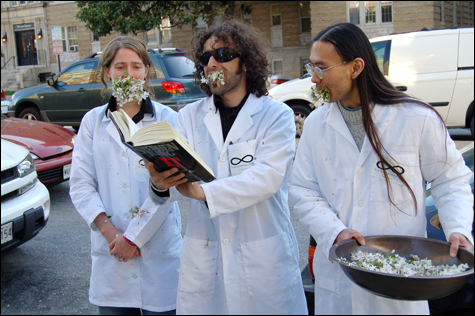
SAY IT WITH FLOWERS: Through performances, Web sites, publications, and jokes, the Institute
critiques the nature and language of public space. |
| The Institute for Infinitely Small Things | The Working Is the Work | Institute of Contemporary Art, 100 Northern Ave, Boston | April 24: 6:30–8:30 pm | 617.478.3100 |
One night at the end of February, seven members of the Institute for Infinitely Small Things were premiering their new performance, The Working Is the Work, at the Institute of Contemporary Art. (They perform it again on April 24.) Wearing their trademark white lab coats, with their Institute’s name and infinity symbol on the back, the collective of artists spread out through the museum and helped the ICA’s staff — scrubbing the lobby, counting visitors, standing guard, cleaning the café.Instituter Katharine Urbati, who tidied the museum store, was asked about items for sale. Someone turned in a lost guidebook to her. “I love that people think I work here, and I’m wearing this ridiculous coat.”
One person asked Savic Rasovic, who was running an elevator for the evening, how long it took him to learn the job. “About a minute. We specialize in small things. And one of them is operating elevators.” Later, a woman suggested that he expand his horizons. “This is my stage,” he insisted — but then he quipped, “I’ll think about it. I may work in another elevator.”
The performance wasn’t much to watch (though Rasovic amused), but the point is the idea, the small gesture. “It’s calling attention to the work done in the museum,” Instituter Catherine D’Ignazio tells me later, “and in a small way trying to be a service to the people who do that work.”
The Institute’s aim is “to research and alter the micro-power structures that shape everyday life in Western society.” Through performances, Web sites, publications, and jokes, the conceptual-artist collective critiques the nature and language of public space — from corporate advertisements and street names to post-9/11 signs and warnings.
“I think they’re trying to reclaim public space,” says ICA curator Carole Anne Meehan. “I think that’s on the mind of a lot of artists today. Everything is corporatized, directed. Especially since 9/11.”
“It’s very political-minded, but it doesn’t knock you over the head with it,” explains DeCordova Museum assistant curator Dina Deitsch. “It’s the idea that minor acts can be powerful political statements.”
It has been a good winter for the Institute. There have been the two ICA performances, and inclusion in next month’s DeCordova Annual Exhibition. D’Ignazio has been named one of four finalists for the ICA’s 2008 Foster Prize, which recognizes local “artists of exceptional promise.” And in February she received an award from the New England chapter of the International Association of Art Critics for a 2007 performance.
The Institute’s ringleaders are Rasovic (a/k/a “Sasha”), 34, of Cambridge and D’Ignazio (a/k/a “Kanarinka”), 32, of Waltham. When not making art, Rasovic designs Web software and D’Ignazio teaches at the Museum School and Rhode Island School of Design and does freelance software programming.
They met in 1999, when they worked together at a local firm developing business management software for Fortune 500 companies. They began wondering what the hell they were doing with their lives. So in 2000, they founded iKatun (“katun,” they tell me, is a South Slavic word for “temporary village”), which began as an art and technology collaborative that created installations of LED lights and satirical Web sites to help people pray on-line. It evolved into a non-profit umbrella agency for their various endeavors — the Institute, D’Ignazio’s solo projects, and Platform2, a collaboration with local artists Andi Sutton and Jane D. Marsching that has organized public discussions on the nature of art, failure, race, class, and the social idea of the commons.
The Institute changes in size and members depending on the project. Everybody hashes out ideas via an e-mail group, and when a project goes into action, people may get together every couple of weeks to plan. The name was inspired by a French calculus book with a title that means something like The Analysis of Infinitesimal Things. The title intrigued D’Ignazio, and it became fundamental to her thinking — think small to get at the big. “Each project,” she’s written on her Web site, “reinforces the (perhaps romantic, perhaps true) notion that a small, imaginative gesture can offer up alternative political and æsthetic ways of being together.”
In Corporate Commands, the Institute built a Web database of advertising slogans that the members mined for some 15 performances in which they would “try to perform each command as literally as possible.” In 2004, a group of Instituters in lab coats lay down on a snowy sidewalk in Cambridge’s Central Square and rolled around beneath an advertisement in a shop window urging passers-by to “rollover” their cellphone minutes. “It’s kind of pointing out the absurdity of a lot of things we take for granted,” says Jim Manning, who has worked with the Institute for close to four years.